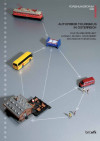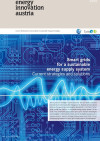Suchergebnisse für "Factsheet: Energietechnologien gestalten, die für alle sinnvoll und nutzbar sind"
Micro Gas Turbine
Holz-Passivhaus Mühlweg: Eröffnungsfeier
21. Jun 2007
Mühlweg 741210 Wien, AT
Fünfgeschoßiger sozialer Wohnbau in Holz-Mischbauweise
Ecological and Social Efficiency Index - EASEY X
Basing on a model and indicators for valuing sustainability of companies quoted at the prime market of the Vienna stock exchange methods and instruments have been developed to analyse their performance. By the connecting step company data have been collected and analysed by four different methods (SPSS, EVA, SVA, MCA Outranking). On a 100 scores scale five companies exceeded barely the mark 70, 6 rank between 60 and 69 further 5 between 52 and 59. The aim is to launch a sustainability EASEY index 2004 or beginning 2005.
e80^3-Buildings - Sub project 3: Development of technology and components
The main objective of the key project "e80^3" was to develop high-performance renovation concepts focusing on plus-energy-buildings. Afterwards these concepts were realized in at least one or two demonstration-projects.
Service Systems for Pesticide Application: A Concept for Establishing
Concept development for establishing a service system "plant protection". Clarification of core issues and key factors determining the success of application.
Autofreier Tourismus In Österreich

Das Tälerbusprojekt Lungau, Murau, Nockgebiet - ein innovatives Model
Forschungsforum
3/1995
Herausgeber: BMVIT
Deutsch, 6 Seiten
Downloads zur Publikation
What does sustainability mean for a cluster in industry?
Inquiry of requirements, implementation of qualification schemes and coaching in the design of sustainability reports for selected companies of the styrian automobile cluster with special emphasis on environmental and social costs.
Symbiose-4-I&C - Optimal decentralized hybrid storage technologies among different energy systems -4-Industry and Commerce
The project Symbiose-4-I&C analysed the coupling of existing energy networks/-carriers, established on centralized energy network nodes or directly next to a consumer (households, industry and commerce) and the benefits of applying decentralized storage technologies. The optimal position, dimension and the right storage and conversion technology and an optimal energy wide operation of larger consumer groups were estimated for an urban model region.
Semi-manual dismantling of small electric and electronic equipment
Improving the tecnology of manual dismantling processes of small electric and electronical appliances, used in social enterprises. Via software modules, developed do analise dismantling processes, from dismantling-factories to dismantling-parks.
Green facades with moss plants
Development of moss-covered facade panels by selecting and testing of appropriate moss species, new water storage and adhesive substratum, Materials of the support panels and technical construction details, for year-round green, sustainable, maintenance friendly, affordable building facades
LTS Flywheel - Long Term Storage-Flywheel: New approaches for increasing the economically usable storage time and safety
Development of the fundamentals for a Long Term Storage (LTS)-flywheel for decentralized storage of electrical energy (e.g. from wind or PV power plants), with a significant increase in storage time (goal: 12 hours) and safety, featuring low system costs. Therefore, the LTS-Flywheel is an essential contribution to the building of the future.
EASEY - Ecological And Social EfficiencY
Developing an integrative concept for the evaluation of sustainability achievements of enterprises noted at Vienna's stock exchange.
Development of a comprehensive procedure within the design of high-speed-cutting processes in consideration of environmental protection and occupational health aspects
In the metal working industry high-speed-cutting (HSC) in connection with minimal quantity cooling-lubrication promises a high potential for saving process materials. On the one hand costs of purchase and disposal of metal working fluids (MWF) decrease, on the other hand the reduction of dermal diseases and emissions of MWF-dusts are expected.
KRAISBAU - Development of AI tools for a transformation to a circular economy along the life cycle of buildings
The BMK lead project KRAISBAU is a collaboration of 32 partners for the realization of a sustainable and circular construction industry. The project focuses on the development and implementation of AI-supported solutions in circular construction along the entire value chain. The knowledge gained is disseminated through factsheets, roadmaps and training courses with the aim of establishing scalable and efficient approaches for existing buildings.
Multi-purpose apparatus for dedusting and ventilation of flue-gas from biomass-fired boilers
The multi-purpose apparatus is cheaper and requires less material and space. Less power consumption because of utilistion of the cyclone vortex in the induced draft fan.
IEA Solar Heating and Cooling (SHC)
The IEA's Solar Heating and Cooling program has been carrying out joint research activities in the field of solar thermal energy since 1977. The focus is on the active and passive use of solar energy for heating and cooling of buildings, solar district heating and solar heat for industrial applications.
IEA HPT Annex 63: Impact of heat pump placement on noise emissions
Noise emissions from heat pumps are a potential barrier for broad market diffusion of this energy efficiency technology, especially in urban areas. In this project, the influences of noise emissions in the building and in the neighbourhood are characterised, their psychoacoustic effects are analysed in more detail, and tools for digitally supporting heat pump placement are further developed. The results will be presented to relevant target groups in the form of guidelines and other documentation.
CircularFood - High-quality products through cascading recycling cycles of residual materials from the food industry
The CircularFood project investigates the material and energetic cascading use of organic food residues from Austrian food production. The aim is to develop innovative processes for the extraction of high-quality protein components, liquid biofertilizers, organic plant substrates and peat substitutes in order to promote the circular economy and reduce CO2 emissions.
i3 - SustainableFoodManagement
It is the aim of the project to develop a model of sustainability management for a company of the meat processing industry. The management model includes strategy development, goal setting, evaluation of achievements of goals and support to the operationalisation of the model in form of an IT-system. The model is designed and implemented for the production processes of the company in year 1, and in the further years for the whole company and the value chain of the company.
Smart grids for a sustainable energy supply system

Current strategies and solutions
energy innovation austria
2/2016
Herausgeber: BMVIT und Klima- und Energiefonds
Englisch, 8 Seiten
